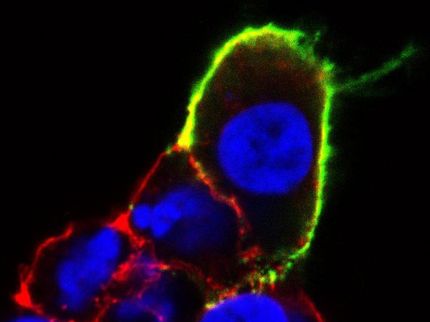New nanoparticles could revolutionize therapeutic drug discovery
A new protein stabilisation technique has been developed by scientists funded by the biotechnology and Biological Sciences Research Council (BBSRC) which could lead to 30 per cent more proteins being available as potential targets for drug development - opening up exciting possibilities in drug discovery.
Understanding the structure of proteins is a vital first step in developing new drugs, but to date, drug development has been slowed because due to their instability, proteins are difficult to work with in lab conditions. However, using nanoparticles, scientists from the Universities of Birmingham and Warwick have found a way to preserve membrane proteins intact, enabling detailed analysis of their structure and molecular functions. These new findings published in the Journal of the American Chemical Society will give scientists access to previously ignored proteins deemed too unstable to work with.
Professor Michael Overduin, from the University of Birmingham, who led the study, explained: "We have shown how a polymer can wrap around and preserve membrane proteins intact in stable nanoparticles. Membrane proteins are the most valuable but technically challenging targets for drug discovery. Finding a gentle solution that preserves their structure and activity, yet is robust enough for experimental interrogation, has eluded scientists for decades, but is now available."
Using a polymer - styrene maleic acid lipid particles (SMALPs), the researchers solubilised a pair of membrane proteins. They found that not only did the proteins maintain their folded structure, binding and enzyme activities in the SMALPs, but also that using the nanoparticles allowed them to be simply and rapidly used for virtually any laboratory analysis. Advantages of SMALPs over traditional ways to solubilise proteins such as detergents include enhanced stability, activity and spectral quality of the protein membranes.
Dr Tim Dafforn who jointly ran the study, said: "In the past, studies have concentrated largely on soluble proteins as membrane proteins are so difficult to make. However, the discovery of the SAMLPs removes this barrier and opens up access to membrane proteins - this has exciting clinical implications as it may enable drug discovery on receptors that are currently too difficult to produce or study by current methods."
Topics
Organizations
Other news from the department science

Get the analytics and lab tech industry in your inbox
By submitting this form you agree that LUMITOS AG will send you the newsletter(s) selected above by email. Your data will not be passed on to third parties. Your data will be stored and processed in accordance with our data protection regulations. LUMITOS may contact you by email for the purpose of advertising or market and opinion surveys. You can revoke your consent at any time without giving reasons to LUMITOS AG, Ernst-Augustin-Str. 2, 12489 Berlin, Germany or by e-mail at revoke@lumitos.com with effect for the future. In addition, each email contains a link to unsubscribe from the corresponding newsletter.




















































